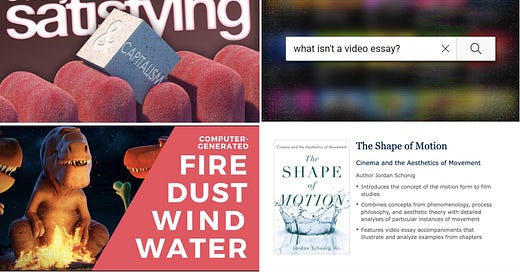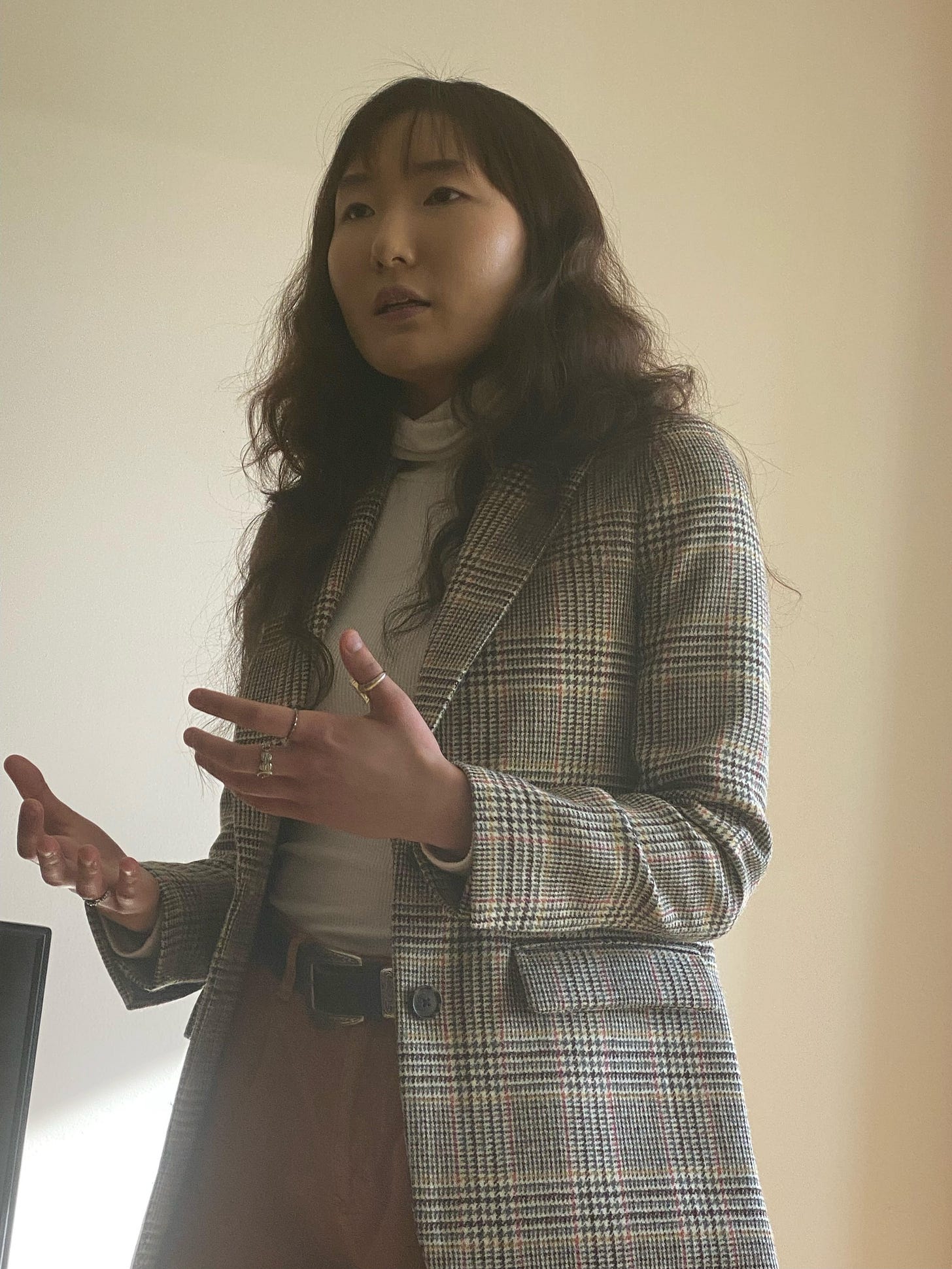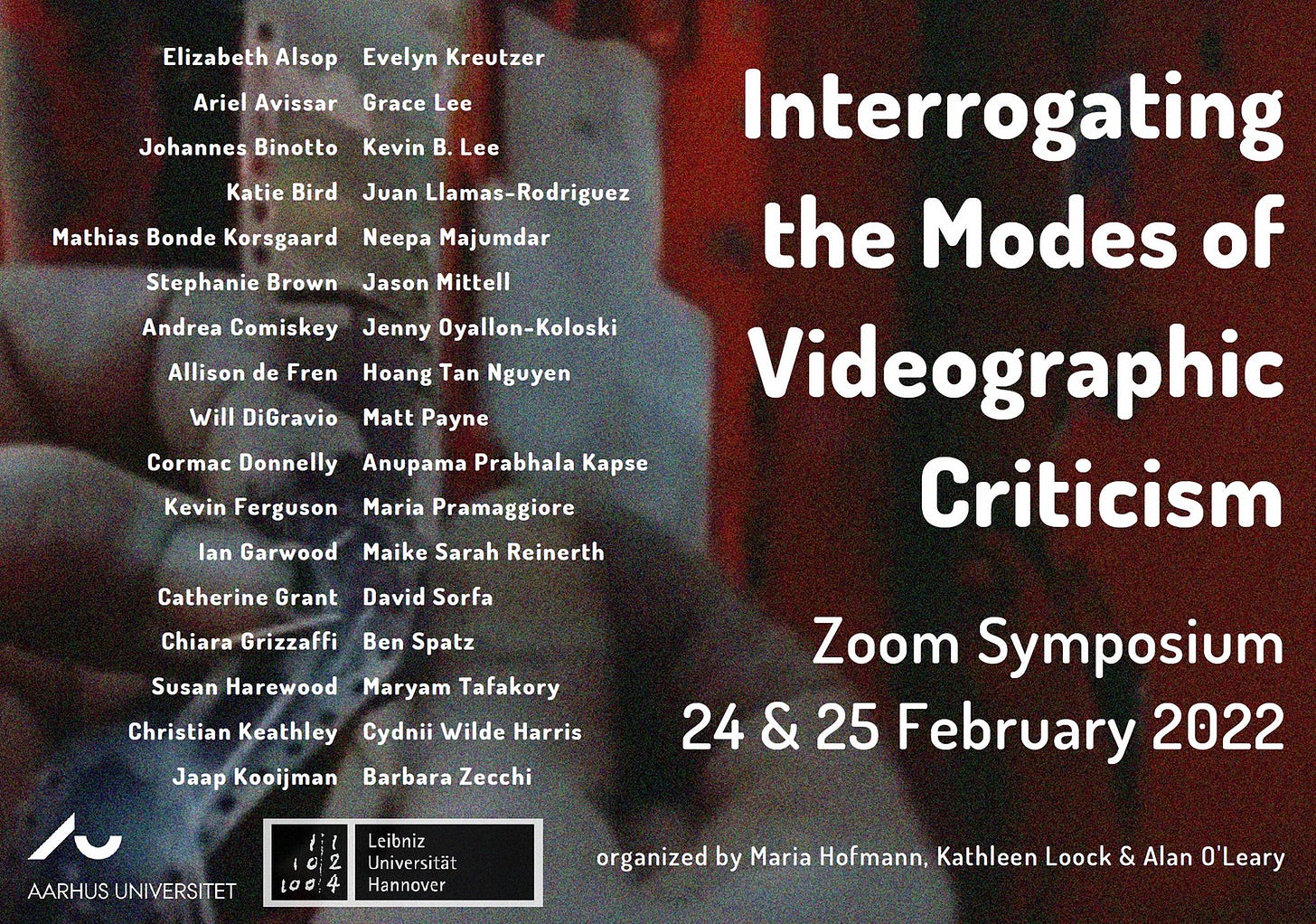Volume 2, Issue 15: Meet Emily Su Bin Ko
Plus new episodes of The Video Essay Podcast & On Your Screen
If you have already listened to the latest episode of The Video Essay Podcast, which features an interview with Jordan Schonig, you will know the big news that I am about to share:
Emily Su Bin Ko, a senior at the University of Massachusetts Amherst, has joined The Video Essay Podcast as an associate producer. I first met Emily’s back in December when I gave the keynote address at the “80 years of Xanadu: The Legacies of Citizen Kane” conference at UMass. Readers of this newsletter may remember Emily’s fantastic video essay, “Citizen Kane: transcending Bazin’s dichotomy,” which I linked to in a recent edition of the newsletter.
As will be clear to anyone who knows Emily’s work, she is a rising star in the field of videographic criticism and I could not be more thrilled that she has agreed to help me out with the podcast. We’re still in the early stages of our collaboration and I can’t wait to see what the show will come to look and sound like with Emily involved.
In addition to Film Studies, Emily is pursuing majors in Philosophy, French Studies, and Psychology at UMass. Her interests include film theory, modernist art cinema, and, of course, videographic criticism. She is also the lead host of the UMassterclass Podcast, the official podcast of the Film Studies program at UMass Amherst. She hope to attend a graduate program after completing her undergraduate studies.
Listeners of the podcast should look forward to hearing Emily’s voice a lot more in the episodes ahead. But in the meantime, please give her a follow on Vimeo and enjoy this short Q&A to get to know her more:
Welcome, Emily! First things first, what drew you to videographic criticism in the first place? What excites you most about the form?
I was first introduced to videographic criticism through Professor Daniel Pope’s “Film Writing and Criticism in the Age of New Media” course at UMass Amherst (shoutout to Daniel!). What excites me about this form is the generative effect of “writing” with the moving image. Videographic criticism can give us a chance to express things that can’t sufficiently be captured in words, and so, I think video essays can become films of their own. The poetic/creative potentialities of the form excites me!
Who are some of your favorite video essayists and/or some of your favorite video essays?
Chloé Galibert-Laîné and Ian Garwood! Watching the Pain of Others was mind-blowing for me. The way in which she brings the spectator in to reflect on their own online behaviors through the expression of her subjectivity helped me experience the epistemological value of videographic criticism! The L/Song Take in Before Sunrise by Ian Garwood is also one of my favorites. I absolutely love the incredible editing, and focusing on the song that Celine chooses and plays in the listening booth enhanced my experience of not only the scene itself coupled with the song, but also the film as well.
What are some of your favorite videographic works you’ve made?
I’m still very new to the world of videographic criticism, so I haven’t made too many! But I did really enjoy producing the video essay on Citizen Kane. There’s one part of the video where I attempt to visualize — by using the actual images from the film — what a sequence would have looked like if Welles had used analytical editing (i.e., more cuts, shorter takes, etc.). That was so fun (and challenging!), and I ended up appreciating the stylistic elements of the film more through this process.
What are you most excited about right now as it relates to videographic criticism, either in your own work or as it relates to the form itself?
Right now, I’m working on my Honors Thesis, which will be a long-form video essay! It’s going to be meta — I'm exploring the ontology of the video essay through the dream metaphor. More generally though, I think the video essay is a constantly evolving form, so I’m really excited for this podcast to potentially shed light on creators who are doing innovative things within the field and productively pushing the parameters of what a video essay can be.
Support the Show on Patreon
Please consider supporting the podcast, this newsletter, and all of the other stuff I do on Patreon! Over on that page, I blog once a month or so (I keep saying I want to do it more, but it’s hard! Time flies!). Anyway, my thinking with the Patreon is that it is a way to support all things I (and now Emily!) do, and that the blog posts are just the cherry on top.
One thing I’m currently doing on Patreon is making my way through kogonada’s complete body of work. You can view my existing posts here: Part I, Part II, and Part III. Part IV will be released on Monday!
Episode 30. Jordan Schonig
The latest episode of The Video Essay Podcast features a conversation with Jordan Schonig, a lecturer at SUNY Binghamton. Schonig's work is particularly interesting in the ways it bridges divides between academic and popular videographic criticism. In 2020, Schonig founded the YouTube channel, "Film & Media Studies with Jordan Schonig," which features lecture-style videos that sometime dip into the essayistic to explore concepts in Film and Media Studies.
Schonig has also published academic video essays and is the author of the new book from Oxford University Press, The Shape of Motion: Cinema and the Aesthetics of Movement, which features audiovisual criticism in addition to the written text. We discuss his video, "The 'Wind in the Trees' from Early Cinema to Pixar," and Grace Lee's "What Isn't a Video Essay?"
On Your Screen: @DancerOnFilm
It’s been a while since the last newsletter! Since then, there has also been another episode of On Your Screen, a companion show to The Video Essay Podcast, dedicated to digital film culture.
The latest episode of On Your Screen features a conversation with Anthony Hon, the creator and curator of the popular Twitter account, Dancer on Film. We discuss Anthony's curatorial approach, thinking of the Twitter account as a rotating gallery, and Anthony's passion for the musical genre. Follow the account @DancerOnFilm.
On Thursday and Friday, I had the great pleasure to attend and participate in an online event organized by Kathleen Loock, Maria Hofmann, and Alan O’Leary, “Interrogating the Modes of Videographic Criticism.” As others have already said, it was one of the most enriching conferences and events I’ve ever attended. Some of the materials from the event can be found on the conference’s webpage. More will be added in the days ahead and more information from the event will be published in this newsletter and/or thevideoessay.com sometime soon, so be on the lookout! And thank you again to Kathleen, Maria and Alan for all of your work!
News & Notes
Please send news and notes for future newsletters to willdigravio@gmail.com
March
Screenworks has a new call for practice for a new special issue on “Musicology on Screen” edited by Estrella Sendra, Barley Norton and Joseph Owen Jackson. The new deadline for proposals is March 1. Learn more here.
MAI: Feminism & Visual Culture has a new CFP: “Doing Women’s Global Horror Film History.” The deadline to apply is March 17. Some select quotes from their website:
You are invited to submit a proposal for our special issue on women filmmakers working in global horror cinema. This issue will be published in late 2023. Each contributor will produce a video essay (5 – 10 minutes) and an accompanying piece of reflective writing (800–1000 words).
No experience in filmmaking or video essays is required. All training will be provided during an eight-month mentorship scheme. This scheme is funded by the AHRC, as part of Alison Peirse’s AHRC Fellowship in Feminist Horror Cinema.
The purpose of the special issue is two-fold:
The first aim is intellectual. This issue builds on the excellent work undertaken to date on women’s film history and develops it in relation to horror film. It also attempts to broaden the field of study: much of the scholarship to date on women and horror has focused on white anglophone women. This special issue opens out the field by illuminating films and filmmakers working outside of these contexts.
The second aim is to train and mentor scholars in how to think about, make and publish video essays. Contributors to this special issue will develop networks in the fields of screen media practice and videographic criticism, diversify their career prospects with new technical skills, and publish a double–peer-reviewed output in the groundbreaking feminist journal. In addition, there will be opportunities for festival engagement. The Final Girls Berlin Film Festival will launch the special issue in an online, live showcase event. FGBFF is a festival run by women, championing horror by women and non-binary filmmakers. In 2021, it was voted one of the best horror film festivals in the world by Dread Central.
Applications are particularly welcomed from early career researchers, PhD students, and junior colleagues. Submissions are encouraged from those with intersectional identities that remain marginalised in the academy. These identities may include but are not limited to Black, Asian, people who belong to a minority ethnic community, people who identify as LGBT+; and people with disabilities. Submissions are also encouraged from scholars who are interested in horror film and/or studying women filmmakers, but who don’t currently have the confidence or the knowledge to make their own video essays.
The scheme will run between May and December 2022. Successful applicants will receive a course of technical training, masterclasses, workshops and individual tutorials. All sessions will take place online, over Zoom. You will not need to purchase filmmaking equipment or software to make your video essay. The training will include working with smartphones, PCs and free software.
Project curators and mentors include Alison Peirse, Catherine Grant, and Miriam Kent.
April
The journal Tecmerin has put out a new CFP for video essays. The deadline is April 15. Learn more here.
Watching
The 29th annual Massachusetts Multicultural Film Festival begins on March 2 and runs through April 27. All films are accompanied by critical, contextualizing introductions by scholars and filmmakers. All events— screenings, introductions, audience Q&As and conversations with filmmakers and guests—are free and open to the public. Unless otherwise noted, livestream events begin at 7:30pm EST. Learn more here. (h/t Barbara Zecchi)
Found Footage Magazine has released a stunning Blu-ray/DVD box set, Found Footage & Collage Films: Selected Works, edited and introduced by César Ustarroz. I have a copy and have enjoyed making my way through it. More here.
Be sure to check out the eighth edition of the Critics' Choice at the International Film Festival Rotterdam, organized by Dana Linssen and Jan Pieter Ekker. More here.
Reading
An article by Kevin B. Lee and Jiří Anger, “Suture Goes Meta: Desktop Documentary and its Narrativization of Screen-Mediated Experience,” published in Quarterly Review of Film and Video. While the article is not open-access, Jiří and Kevin have provided a public link to download the article. Access here.
Chloé Galibert-Laîné and Gala Hernández López have co-edited an issue on post-cinema for the journal Images secondes. The issue includes several videographic contributions, a podcast series, an interactive essay, and more. Access here.





